

Agridisk
Egypt - Alexandria
.jpeg)
Urban farming definition | benefits | What is the meaning of urban farmer?
Description: Urban farming - a term that at first glance may seem contradictory, is in fact an embodiment of a modern, sustainable approach to food production in cities worldwide. This innovative practice has grown way beyond its literal interpretation of merely cultivating, processing, and distributing food in city limits. It has branched into distinct typologies, such as rooftop and vertical farming, community gardens and hydroponics. More than just a means to sustain urban dwellers, it represents a holistic initiative that intertwines with themes of food security, ecological balance and social cohesion. The remarkable advantages that urban farming offers both to the immediate community and the environment, render it a key component in urban development strategies striving to address the daunting challenges posed by a rapidly urbanizing world. Urban farming, also referred to as urban agriculture, can be precisely defined as the practice of fostering, cultivating, and distributing food in urban areas. This practice manages to remarkably integrate the agricultural sector into the urban economic and ecological system. Urban farming can consist of animal husbandry, aquaculture, agroforestry, urban beekeeping, and horticulture. Although urban farming has existed throughout history, the surge of interest in recent times appears to be partially influenced by the increasing awareness of the importance of sustainable living practices. Its prevalence in modern contexts is antithetical to the conventional frame of agriculture, which typically occurs in rural regions. The areas in which food production can take place in an urban setting are wide-varied. Private backyards, rooftops or balconies, vacant lots, alongside roads, on steep slopes or river banks, in schools or hospitals, abandoned industrial sites, public parks, and even multistory buildings previously perceived as unsuitable for farming have all been adapted into productive spaces. Urban farming is also distinctive because it is deeply integrated into the urban socioeconomic and ecological system such as use of urban residents as laborers, direct consumption of produce by the farmer, direct sale on local markets, and use of urban resources (like organic waste as compost and town wastewater for irrigation). Notably, urban farming also provides a host of ecological benefits, and has potential for positive local impact. Urban farming can help improve urban biodiversity by providing habitats for various species. Moreover, by using city-produced compost and facilitating compost production on-site, urban farming can act as a waste management strategy. Additionally, urban farming ushers in an empowerment narrative with it being a realistic way for households to slash food bills while increasing the inclusion and consumption of fresh produce. The implications of urban farming extend into nutritional security, ecological benefits and economic developments, augmenting the resilience of cities against the global food system. While fundamental questions around land-use policy, zoning, and legality are yet to be robustly addressed, urban farming has already managed to leave a significant mark on the urban landscape. As cities continue to grapple with the pressing challenges of food security, climate change, and ecological sustainability, urban farming stands out as an innovative and promising solution. In broadening the dialogue on urban farming, it is essential to keenly and critically explore its contribution to urban food security and local economies. Urban farming has undeniably emerged as a transformative initiative providing us with a unique lens to view food production, consumption and circulation, right in the heart of bustling city landscapes. Urban farming directly contributes to local food security by enlarging the food supply. With a rising global population and increasing urbanization, feeding growing urban centers is undoubtedly a significant concern. Urban farming presents an alternative yet vital dietary source, enhancing food diversity and availability for city dwellers. By converting marginal lands, rooftops, backyards, basements, or even walls into potential growing spaces, a considerable contribution to daily food needs can be made, directly enhancing urban food security. Another key benefit lies in the reduced 'food miles'. The production to consumption path is substantially shortened in urban farming, thus ensuring fresh, and often, organic produce reaches the consumers promptly, circumventing long storage periods that might reduce nutritional value, taste and freshness. Considering the global problem of food waste, this also substantially reduces post-harvest losses. The realm of urban farming is not just limited to contributing to food security but also generates ripple effects on urban economic fabric. The local economy tends to benefit via the creation of employment opportunities. Urban farming initiatives can provide people with skills and knowledge for employment and entrepreneurship within the local food economy. For example, growing, processing, selling, and distributing the local produce can offer community residents job opportunities. Moreover, this can often provide a source of supplemental income, benefiting low-income urban households. The incorporation of urban farming into the local economy can also lead to cost savings. Local municipal authorities can considerably reduce transport, storage, and disposal costs of food. Moreover, the opportunity for urban waste recycling in the form of compost generation provides an additional contribution towards sustainability while also controlling costs. The education enrichment that urban farming imparts cannot be underestimated, providing a means for urban dwellers to reconnect with nature and become active participants in food production. This connection helps foster a better understanding of nature and food systems, encouraging healthier eating habits, behavioral change, and a greater sense of responsibility towards our environment. Furthermore, there is an evident impact on the accessibility and affordability of fresh produce, particularly in areas termed as 'food deserts,' characterized by limited access to affordable and nutritious food. Urban farms, thus stylized as 'food oases,' act as buffer zones in such areas, addressing the disparity of quality food availability. Urban farming, thus, is carving out its own niche in the contemporary urban narrative. It skillfully intertwines the threads of sustainability, food security, economization, and the local economy, weaving a tapestry that may well define the future of our urban environments. Despite its intricate challenges, the promise it holds makes urban farming an essential cog in our urban machinery. Through scientific and academic deployment of innovative strategies, it appears we are only witnessing the sunrise of an urban farming revolution that harbors significant potentials for our cities and their inhabitants. As the world forges ahead into the 21st century, urban farming is assuming a substantial role in enhancing ecological sustainability and urban resilience. A critical objective of such progressive farming practices is the efficient utilization of urban space – a finite resource. By extending the agricultural sphere upward onto rooftops, underground in tunnels, and even into abandoned buildings, urban farming maximizes output while minimizing ecological footprint. One of the notable contributions of urban farming is its instrumental role in the reduction of food miles. To elaborate, food miles are a measure of the distance food travels from its source to the consumer. Traditional agricultural models necessitate the transportation of food over large distances, leading to significant carbon emissions. Conversely, urban farming, by its inherently local nature, ensures produce is available within a close radius, thereby markedly decreasing food miles. Another key feature of urban farming is its potential to counteract the phenomenon of 'post-harvest losses.' With traditional farming, a substantial amount of fresh produce perishes during transportation and storage - a consequence of long distances and logistical inefficiencies. However, by eliminating the need for long-distance transportation, urban farms drastically reduce these losses, ensuring a higher proportion of harvested food reaches consumers. Urban farming contributes significantly to local economies, providing tangible economic benefits and employment opportunities. These farms often employ local residents in cultivation, sales, and logistics, enhancing local employment rates. Additionally, produce cultivated locally is often more competitively priced compared to imported items, thus benefiting local consumers and the broader economy. For municipal authorities, urban farming can translate into a notable reduction in costs associated with waste management. By repurposing organic urban waste into compost, urban farms effectively aid in managing waste, removing the necessity for its disposal in distant landfills. This not only mitigates the financial burdens of municipal waste management but also reduces the environmental impact of waste transport and containment. Urban farming undoubtedly provides crucial educational value and enrichment opportunities, presenting urban inhabitants with a connection to nature and an understanding of food sources. It fosters public knowledge about sustainable agriculture and the eco-benefits of local food production. Community farms, in particular, serve as living laboratories for children and adults alike to learn hands-on about horticulture and food production. In addition, urban farming has made significant strides in addressing the issue of food deserts. These are areas in which access to fresh, affordable food is limited, particularly pervasive in lower-income urban locales. Urban farms, especially ones that prioritize accessibility and affordability, can significantly alleviate food insecurity in these regions. Indeed, embarking on a more extensive exploration of the merits urban farming provides paints an optimistic picture of the future. This practice is not merely a fringe movement but a critical component of urban sustainability and resilience. Undeniably, there is much to gain from integrating the principles of urban farming into our urban ecosystems and economies. Emphasizing the symbiosis between urban life and natural resources, urban farming demonstrates an impactful pathway toward ecological sustainability, underscoring the seamless link between the health of our cities and the health of our planet. Building Social Relationships Through Urban Farming The role of urban farming extends beyond the tangible benefits of food security, ecological sustainability, economic development, and efficient use of urban space. An intriguing area of consideration is how urban farming influences the social fabric, specifically in how it fosters relationships and strengthens community bonds in urban settings. A seminal point in the social benefits of urban farming pertains to the communal activities that are inherent in its practice. People, irrespective of age, come together to work on collective farming projects, creating organic platforms for interactive social connection. Facilitation of these interactions helps to blur societal divides, facilitating intergenerational and intercultural dialogue, thus fostering a sense of inclusivity and mutual respect. Moreover, the shared sense of responsibility towards a common goal can help to strengthen community bonds. Furthermore, the participatory nature of urban farming fosters a sense of ownership and local responsibility. When members of a community work towards cultivating their urban farms, they develop an emotional connection to their locale. This identification with a physical place serves to foster a profound sense of belonging, grounded in the tangible act of nurturing and reaping from the land. Urban farming initiatives also provide an avenue for community-led problem-solving strategies. They offer spaces for community members to engage in conversations about their food systems, waste management, and local biodiversity. These discussions are integral to the promotion of collective decision making and advocacy for urban agricultural policies. They also provide avenues for civic education and engagement, promoting awareness of broader environmental and social issues. Importantly, urban farms can also act as an antidote to social isolation, a common issue in urban environments. Shared agricultural projects can serve as a hub for social activities, offering regular opportunities for interaction. Social connections fostered in this context invariably aid in combating feelings of isolation and loneliness, thereby contributing to improved communal mental health. Urban farms also offer potential for institutional partnerships, strengthening the link between communities and organizations such as schools, health centers, and nonprofits. This collaboration further anchors the community, fostering mutual support, and shared resources for overall benefit. Overall, the role of urban farming within a social context cannot be overstated. It leverages its foundation in collaboration to bring about improved social relationships and transformational community growth. Thus, amid its myriad values lies a further testament to the immense potential of urban farming: it does not simply cultivate crops, but it also serves as a formidable tool for cultivating comprehensive community development. The impact that urban farming has on food security, ecological well-being and social stability is undeniable. It has proven to be an effective solution to not only bypass urban food insecurity, but also promote dietary diversity and bolster city economies. By contributing to urban biodiversity, reducing waste and food miles, and calming the urban heat island effect, urban farming asserts its ecological significance. Besides, through the creation of resilient, green spaces, it enhances a city's adaptability in the face of climate changes. From a social perspective, urban farming facilitates strong community bonds, promotes physical and mental health, and encourages a sense of shared responsibility among city dwellers. It is thus crucial that urban farming is not viewed as a mere trend, but as a viable, sustainable and innovative approach to urban living, that holds great promise for the future of our cities.Urban farming definition | benefits
Understanding Urban Farming
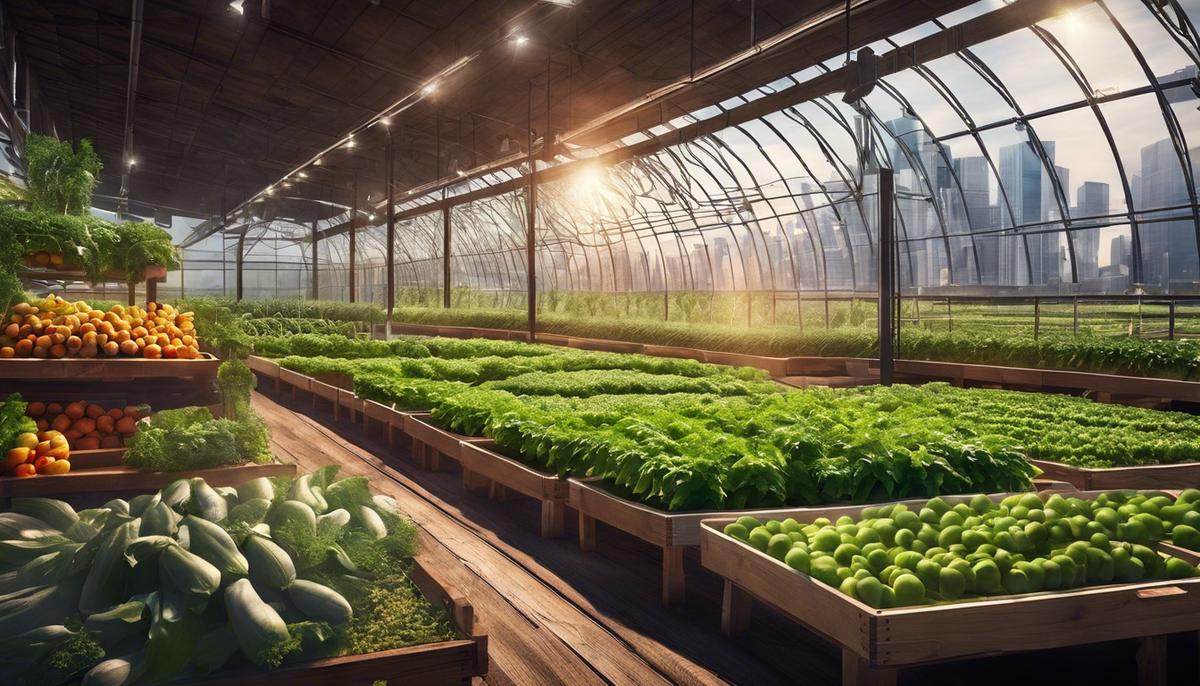
Impacts of Urban Farming on Food Security
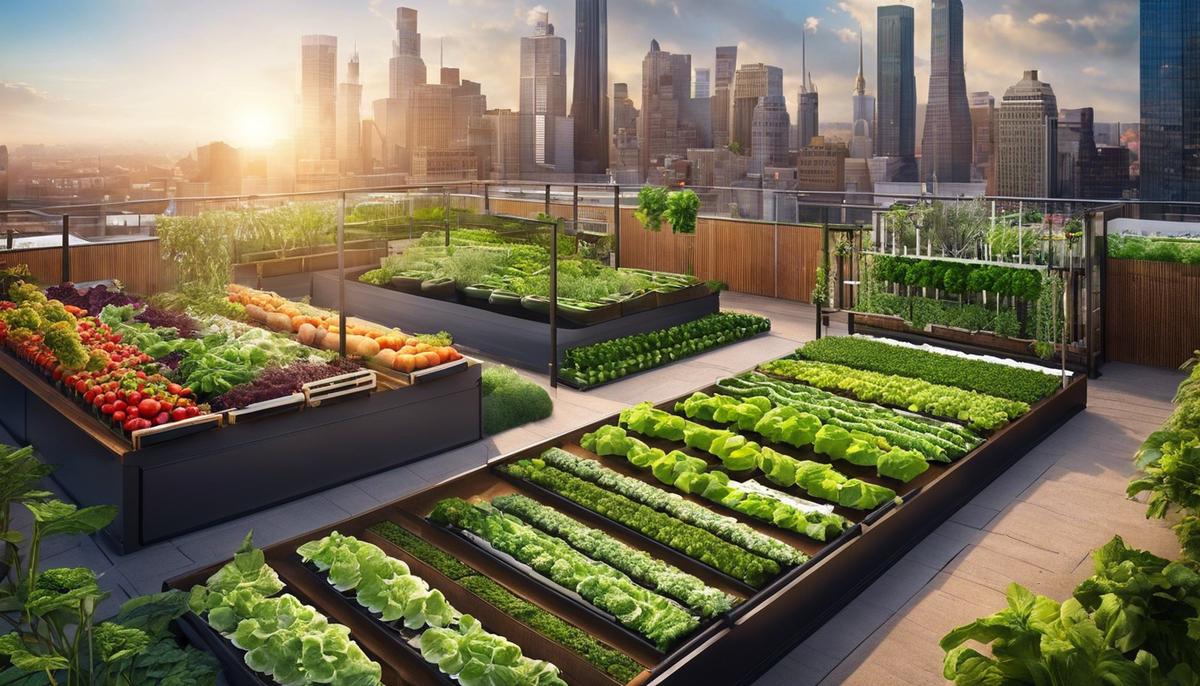
Ecological Benefits of Urban Farming
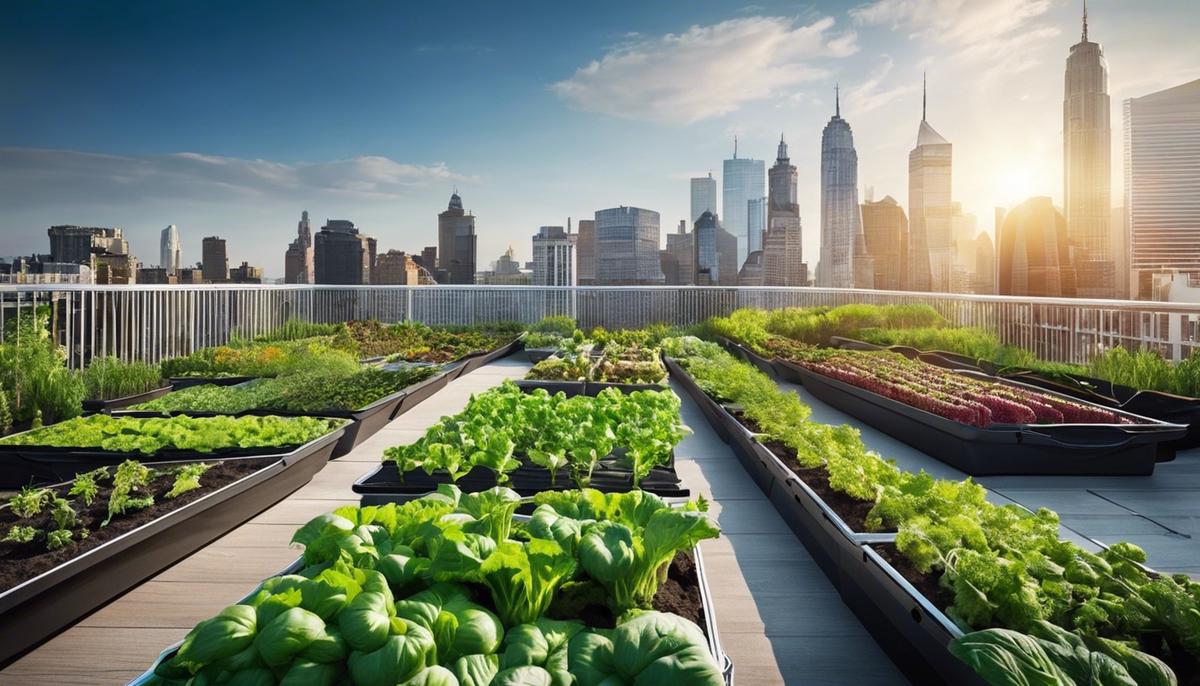
Social implications of Urban Farming
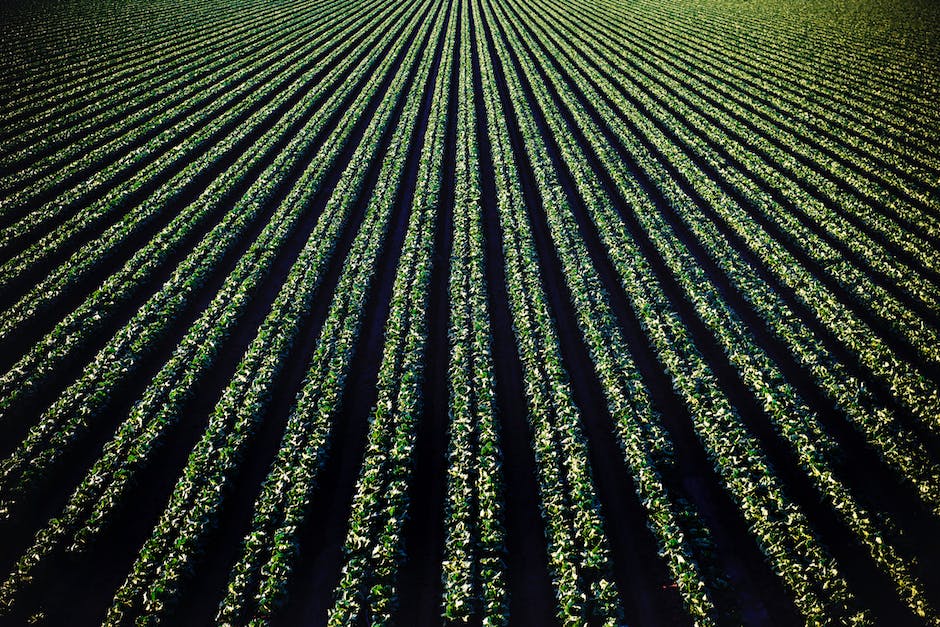
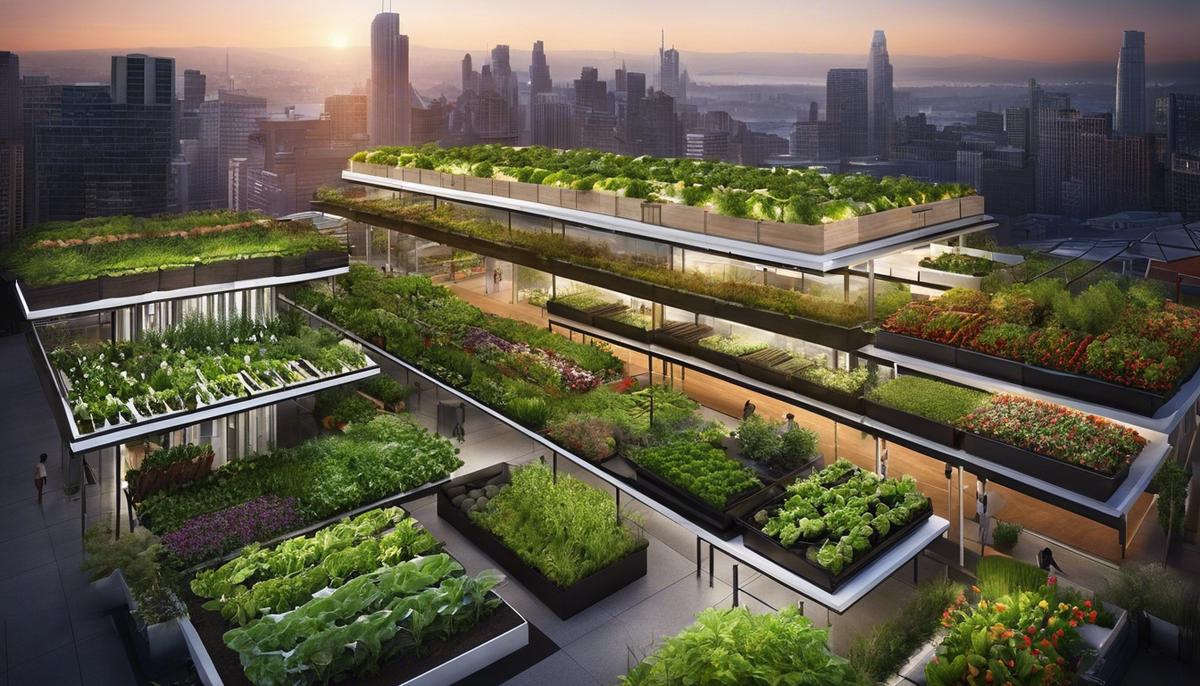
In the bustling mosaic of urban life, where concrete jungles and high-rise buildings predominate, the concept of farming seems alien and out of place. Yet, intertwined within this seemingly incongruous setup, the presence of agriculture persists through the relatively untapped concept of urban farming. The phenomenon of urban farming is not a mere buzzword, but an essential industry unfolding within our city horizons, revolutionizing the ways in which we consider our spatial geography and consumption habits. Urban farmers, the heroes of this narrative, purposefully weave farming into the fabric of city life, parlaying a varying scope of operations, unique farming techniques, an assortment of crops, and an admirable blend with the urban environment. The quest to understand the intricacies of urban farming and the impacts it heralds is both informative and thought-provoking, heralding a fresh perspective on the contemporary urban landscape.
The term "urban farmer" generally refers to individuals or organizations that cultivate, process, and distribute food in or around urban areas. The unique characteristic of these farmers is that they don't require a vast tract of land to facilitate their farming practices. Instead, they creatively utilize limited spaces including rooftops, abandoned lots, and even balconies, bringing agriculture into the urban environment. Their practices typically integrate principles of sustainability, with a focus on organic cultivation and the reduction of waste; they minimize the use of synthetic fertilizers and pesticides, instead opting for natural methods of pest control and soil enrichment.
Their farming techniques also deviate from traditional practices, embracing innovative methods such as vertical farming, hydroponics, and aquaponics. Vertical farming, as the term implies, capitalizes on spatial economy by growing plants on vertically inclined surfaces. Hydroponics is a soil-less farming system, relying on nutrient-laden water for plant growth. Aquaponics, on the other hand, is a symbiotic system intertwining aquaculture and hydroponics; fish waste acts as a natural fertilizer for plants, and the plants in turn purify the water for the fish.
Remember, urban farming is not merely an application of agrarian skills within city limits. It is an amalgamation of agricultural techniques, creativity, and technology, with a resolute commitment to sustainable living. Additionally, it encompasses a broader social mission. Urban farmers often incorporate educational programs, striving to subvert the disconnect urban dwellers might feel from their food sources and to cultivate a more harmonious relationship between people, their food, and the environment.
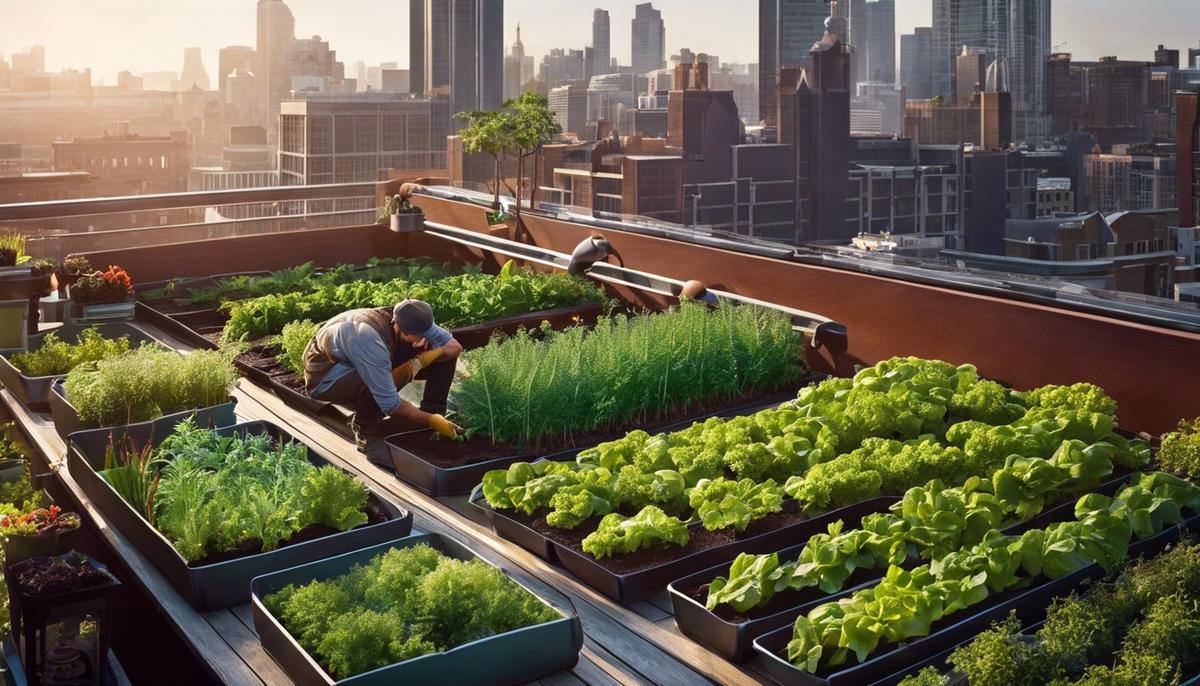
Delving into the multifaceted impact of urban farming on food systems reveals a transformative avenue for food production as we comprehend it. Chief among these is the enhancement of local food systems, critical in light of contemporary challenges of food security, while directly negating hefty ecological costs of traditional large-scale farming—food miles and consequent carbon emissions. Furthermore, urban farming introduces an element of seasonality and freshness not seen in global supply chain models. As space-stricken cities turn rooftops, vacant plots, and balconies into thriving food gardens, residents get to know the origins of their food, fostering a deepened appreciation for the innate value of fresh, locally grown produce.
Careful examination of the implications of urban farming also unveils remarkable social and economic reprisals for communities involved. The roots of urban farming extend beyond food production into the creation of green jobs, enhancement of community interaction, and facilitation of urban regeneration. The urban farming movement mobilizes communities to become active participants in their own food production, engendering community empowerment and connectedness. Additionally, urban farms can serve as outdoor classrooms, providing unique, hands-on education opportunities where residents can learn about nutrition, sustainability, and the science of plant growth—further fortifying a society's connection to the circle of life in an increasingly urbanized world.
In retrospect, the notion of urban farming is much more than a leisure pursuit or aesthetic green development in our cities. Seemingly, it reveals a more pragmatic solution, revitalizing our relationship with food, the land, communities, and injecting a spark of life in urban environments desperately craving for sustainability, healthfulness, and community cohesiveness.
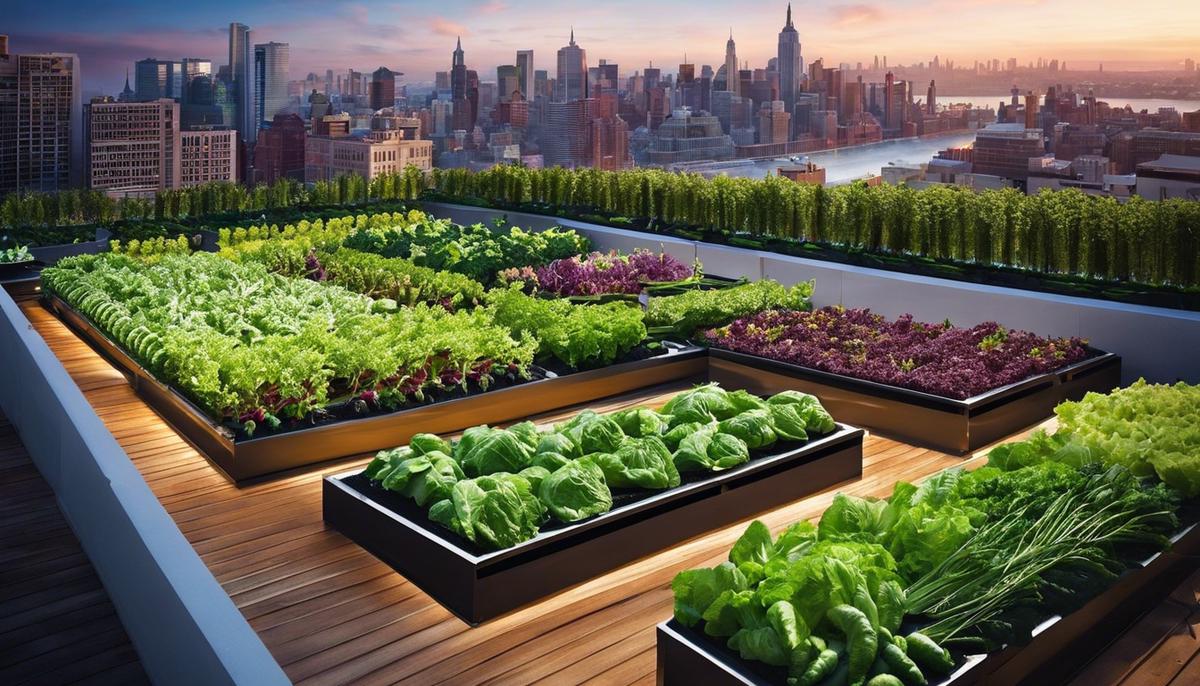
The tapestry of urban farming is not just a testament to human innovation or the resilience of nature, but a canvas where the societal, ecological, and aesthetic implications of our choices are rendered visible. Far from being a mere affix to the urban setting, farming in cities fundamentally alters our relationship with food, our urban lifestyles, and the spaces we inhabit. It fosters stronger local food systems, enhanced access to fresh produce, improved food sovereignty and security, as well as pulsating community cohesion. At a larger scale, the influence of urban farming hints at a sustainable, resilient future firmly rooted in the urban scenario, catalyzing fundamental shifts in urban planning and city life. The urban farmer's saga is a challenging and rewarding quest, imbuing the city's rigid veneer with verdant hues, modifying rhythms, and inspiring city dwellers to forge a sustainable, healthy, and cohesive future.